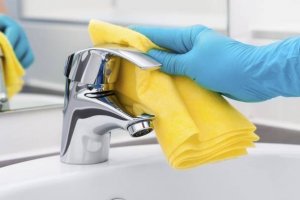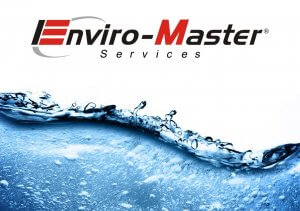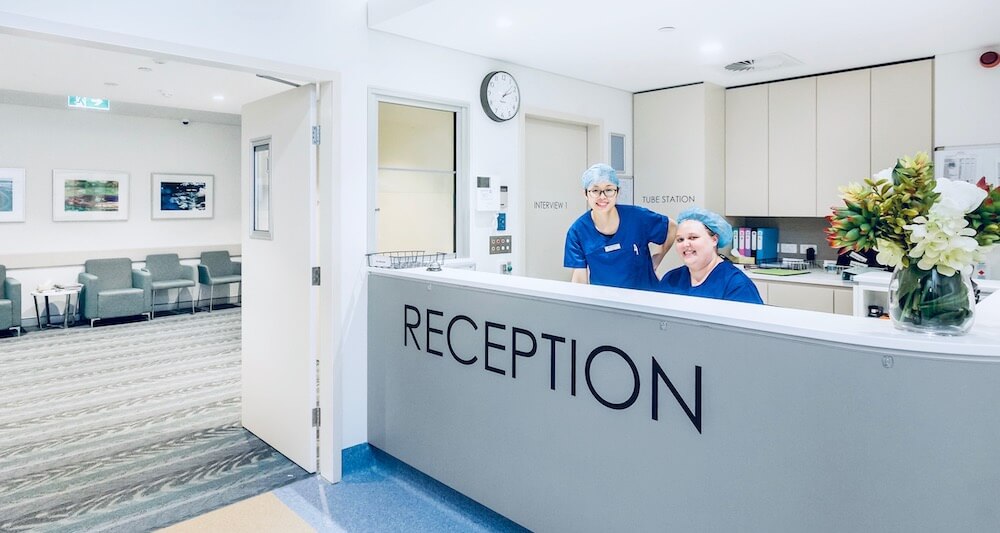Is restroom cleaning in a hospital more important than in any other environment? In light of the recent scourge known as Covid 19 (Coronavirus), the answer is an unequivocal “yes” and the reasons are manifold. Read on to learn more about why every Pittsburgh and Western Pennyslvania hospital should engage professional deep-cleaning, ongoing restroom hygiene services, or contact our team today — (412) 462-5525
First and foremost, due to transient visitors, the importance of ongoing hygiene control is more important than for any other commercial environment. Other sectors, such as schools, restaurants, offices and apartment complexes for the most part concern healthy occupants. While there is always the chance that individuals may report into work or class with some communicable illness, there is always the option to call in sick.
This equation differs from hospital or long term care facilities where the health of patients is always fragile and potentially compromised. While all surfaces areas, particularly toilet fixtures and seats, should be cleaned and then disinfected regularly and thoroughly, hospital restrooms are and must remain the focus of any cleaning regimen because they are hot beds for the spread of disease via the transmission of body fluids and bacteria. In older hospitals, especially in cases where patients in a ward may share a restroom, the threat of bacterial transmission is even greater.
A restroom in any commercial facility receives a generic visual inspection that measures only if the work is completed or not. In the health care sector, that is only one issue. For example, bacteria, allergies and sensitivities among patients with fragile immune systems caused by cleaning product residues can cause adverse reactions that could be dangerous. Our Enviro-Master professionals understand the importance of using techniques and products that won’t trigger sensitivities.
Hygiene As A General Health Standard
The word, hygiene, derives from Hygeia, the Greek goddess of health. During the Middle Ages, the average human life expectancy reached barely into the teen years both because of high infant mortality rate and the fact that much of the European world at that time lived in an atmosphere of filth, poor personal hygiene and almost non-existent sanitation. Epidemic and endemic diseases such as: bubonic plague; typhus; smallpox and tuberculosis (aka the white death) claimed the lives of many populations of all ages.
Hygienic practices began to emerge after the Industrial Revolution (1750-1850) with the discovery of the germ theory of disease. There are many heroes from the place in time including: Dr. Ignaz Semmelweiss and Florence Nightingale. The former was a Hungarian physician who was ostracized by his peers for promoting the idea that if obstetricians washed their hands before delivering babies, the number of women dying in childbirth would decrease significantly. Florence Nightingale promoted hospital reform at Scutari Barrack Hospital during the Crimean war by convincing the medical world that hygiene and sanitation as well as professional nurses tending to the sick in hospital wards saved lives.
The Contemporary Hospital and Hygiene
The modern cleaning industry and the experts at Enviro-Master have helped to re-engineer restroom cleaning to a scientific level heretofore unseen. The cleaning process has become more complex, relying heavily on scientific formulations and technological advances in the form of new chemicals and equipment that combat and destroy dangerous pathogens.

There are tools specific to hospitals and health care facilities that are not available elsewhere. Most important is the measurement of whether or not a surface has been disinfected either by the use of adenosine triphosphate (ATP) or fluorescent gel testing. Infection control specialists rely on the data gleaned from these tests to determine the effectiveness of cleaning products used and risk assessment.
Ultra violet (UV) lighting is also very effective in the treatment of bacteria in hospital restrooms as well as spray and fogger type disinfectants. Perhaps the most important distinction between sanitizing a hospital bathroom and that of any other industry lies in the degree of monitoring the quality levels of applied disinfectants and infection control.
Treating Hospital Restrooms As If They Were Isolation Areas
Michael Burke is an environmental services manager for North Memorial Medical Center, a large hospital in Minneapolis, Minnesota, and he firmly believes that treating restrooms with the same degree of care one would apply to an isolation room is the only way to ensure the highest degree of sanitation and decontamination. He trains his staff to disinfect all high-touch points and demand that staff follow his written specifications.
Some Startling Hospital Restroom Statistics
According to new data received by the Center For Disease Control, (CDC), approximately one in every 25 patients acquires a health care-associated infection (HAI) during their hospital care. This adds up to a disturbing 722,000 infections per year. Of this number, some 75,000 patients die of their infections. In the words of CDC Director, Thomas Frieden, MD, MPH, “even the most advanced health care will not work if clinicians neglect basic practices such as hand hygiene.”
A 2008 study published in BMC Infectious Diseases conducted by a team of Canadian scientists headed by Michelle Alfa, revealed that up to one-third of hospital toilets are not properly cleaned. The Manitoba team focused on the spread of “super bugs” and the bacteria known as Clostridium difficile. This organism is often found in long term care facilities and it can remain on toilets even after a thorough wipe down. It can cause a wide range of unpleasant conditions ranging from diarrhea to colon infections.
According to Alfa: “Various studies have looked at the most effective cleaning agents, but none of these studies considered whether housekeeping staff were actually cleaning the toilets properly. It is impossible to assess the effectiveness of any action against these bacteria unless you can be sure that cleaners comply with protocols.”
The Importance of Hand Hygiene in Hospitals

The most important tool in preventing the spread of health care-associated infections between patients is hand hygiene. Despite the fact that the most hospitals have strict hand hygiene standards and often employ outside experts such as as our teams at at Enviro-Master Pittsburgh, the application of policies is not as easy to enforce, as it may seem. In the words of: Dr. Michael Edmond, MD, MPH, Richard P. Wenzel professor of internal medicine in the division of infectious diseases at Virginia Commonwealth University:
“When we look at all of the things that we can do to prevent infections in the hospital, one of the most important things about hand hygiene is that it works for so many different types of organisms, and you get a lot of bang for the buck…You have to practice it at a high level of compliance in order for it to work. There are so many opportunities for hand hygiene, and it is difficult to get to a level of compliance where we’re able to make changes to infection rates.”
Enviro-Master and Pittsburgh Hospital Hygiene
Founded in 1983, this international leader in the provision of hygiene services and products for public restrooms has always had the same goal; namely, to build a healthier world, one restroom at a time. They strive to go that extra mile far beyond the point where a hospital’s janitorial staff simply cannot reach. Their cost effective options are very attractive and usually include a monthly fee that can be recorded as operating costs.
Maintaining effective restroom hygiene in a hospital or health care facility is serious business and requires comprehensive services, which are best left to the skill and experience of the professionals at Enviro-Master Pittsburgh.

A janitorial staff does the best they can with the tools they have, but they are not sufficient in accomplishing the gargantuan task of eliminating pathogens from hospital restrooms. What may appear clean on the surface may very well not be.
Porcelain surfaces may look spotless, but soap-applicators and sinks, are havens for harmful bacteria and germs. Doorknobs, stalls and almost every tactile restroom surface are also vulnerable to bacterial invasion. Every time someone flushes a toilet in a hospital bathroom, millions of particles containing pathogens are released into the air, and they can spread up to twenty feet!
Enviro-Master Pittsburgh’s Many Hygienic Products And Services
We are a leading purveyor of commercial restroom products and services and are dedicated to the provision of 100% sustainable solutions for commercial interiors throughout Greater Pittsburgh and Western Pennsylvania, as well as Eastern Ohio and the West Virginia panhandle. Our focus is public restrooms, large or small, and our services include deep fixture cleaning and electrostatic disinfecting applications, which target specific surfaces by placing a positive or negative charge on the disinfectant itself as it leaves the spray nozzle.
Even more, we do not work alone — our partnership with the internationally renowned ambient air-care masters at Air-Scent enhances our offerings to include superior environmental odor control and air-freshening strategies to any and all types of commercial settings.
The Enviro-Master Paper Products Program
We offer a simple and cost-effective way to save money on essential items, for example, paper towels and toilet paper and other supplementary bathroom items such as: hand sanitizers, soaps, dispensers and commercial-grade air freshener diffusers supplied by Air-Scent International.
Enrolling in our Paper Products Program insures that company facilities are well stocked with necessary hygiene products. One of our most popular paper products is the single-use paper towel, which far surpasses the efficiency of hand dryers, which are known to cause the spread of water infused with germs throughout a restroom. We offer two options: center-pull or multi-fold towels for the chosen dispenser.
In Conclusion
The importance of maintaining hospital restroom cleaning cannot be underestimated. Cleaning for aesthetics and cleaning for health are two crucial elements that intersect when it comes to public bathroom maintenance, but the latter, especially in the case of hospitals, must be the primary objective. Our many hygienic initiatives insure that both imperatives can be achieved, and that hospital restrooms as well as those in non health-care facilities, can be both aesthetically and hygienically clean.
There will always be the possibility of germ transmission in public restrooms, but by employing thorough cleaning and disinfecting protocols that focus on malodors and visible stains, and treating problem surfaces where pathogens tend to congregate, the professionals at Enviro-Master can help provide a healthy environment for both hospital visitors and patients. Enviro-Master Pittsburgh is every hospitals best partner.
Call our team today! We’re here to help.
Final thought on hospitals: A hospital bed is a parked taxi with the meter running. ~ Groucho Marx

